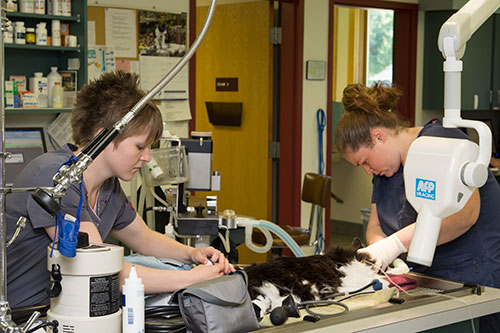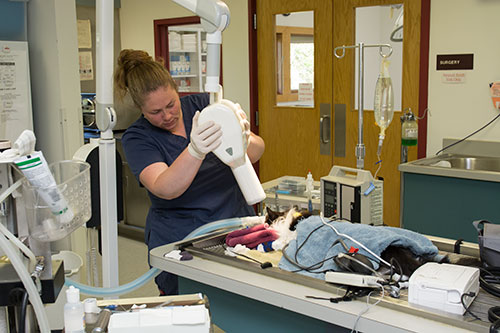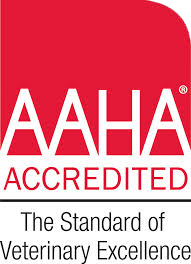Annual Dental Exams at the Veterinarian Play Important Role in Maintaining Pet Dental Care
Good oral health is an important part of good overall health for your pet. Eighty percent of dogs and 70 percent of cats have dental disease by the age of three, according to the American Veterinary Dental Society. It is the most frequently diagnosed health problem in pets. Dental disease is an often unrecognized source of pain in pets. Preventive home care and routine dental cleanings are the keys to maintaining healthy teeth and gums.
 We will examine your pet's teeth and gums to help determine if there are any dental issues you should know about. After a brief visual examination, we may recommend options for at-home dental care, a more detailed examination (which requires sedation) or a dental cleaning. Our dental services at Grand Rapids Veterinary Clinic include ultrasonic teeth cleaning and polishing, oral digital radiography (X-rays), tooth extractions and minor oral surgery.
We will examine your pet's teeth and gums to help determine if there are any dental issues you should know about. After a brief visual examination, we may recommend options for at-home dental care, a more detailed examination (which requires sedation) or a dental cleaning. Our dental services at Grand Rapids Veterinary Clinic include ultrasonic teeth cleaning and polishing, oral digital radiography (X-rays), tooth extractions and minor oral surgery.
Regular professional cleaning is important to maintaining your pet's health at any age. Dental cleanings must be performed under general anesthesia in order to properly and safely examine and clean the teeth. We use modern and safe ultrasonic equipment; each tooth is thoroughly cleaned above and below the gum line. Dental technicians polish the teeth to create a smooth, lustrous surface more resistant to plaque buildup.
After the teeth are cleaned and polished, we perform a thorough oral exam and check each tooth for signs of dental disease (gum loss, root exposure, pockets around the root). Extensive dental disease may require the tooth to be removed (extracted). Some of the larger teeth may require oral surgery to safely remove each individual root. We have extensive training and experience to perform these procedures properly. Oral nerve blocks are performed, and additional injectable pain medications are administered if teeth are extracted. Your pet may also be sent home with pain relief medication. Pets recover quickly following these procedures, and, once the gums have completely healed, they can resume eating their regular dry kibble after several days, even when multiple teeth were extracted.
A veterinarian should evaluate your pet's dental health at least once a year. We can recommend and demonstrate preventive measures you can begin at home based upon your pet's dental needs. If you are concerned that your pet may have dental disease, please make note of the following common signs.
Common signs of oral disease include:
- Tartar buildup
- Red and swollen gums
- Bad breath
- Drooling
- Loose or missing teeth
- Changes in eating or chewing habits
- Pawing at the face
- Generalized depression
- Pain when mouth is handled or touched
One of the most common signs of dental disease is bad breath. Bad breath is caused by bacteria. Over time, bacteria leads to plaque and tartar buildup on your pet's teeth. The result is bad breath, gingivitis (inflammation of the gums) and other progressive signs of dental disease. This is the first stage of dental disease. With progression, there is breakdown in the gum tissue attachment to the tooth and pockets develop below the gum line where bacterial infection sets in. This is called periodontal disease. Over time the bone becomes weak; the teeth can become loose and need extraction. Because periodontal disease is below the gum line, a professional teeth cleaning under anesthesia is the only way to properly treat periodontal disease.
 Many systemic health problems start in the mouth. Plaque, tartar, periodontal disease and infected teeth serve as a source of inflammation and infection for the rest of the body. Bacteria in the mouth can get into the blood stream and may cause serious kidney infections, liver disease, lung disease and heart valve disease. Oral disease can also indicate that another disease process is occurring elsewhere in a pet's body. A thorough physical exam combined with appropriate laboratory work can determine if this is the case.
Many systemic health problems start in the mouth. Plaque, tartar, periodontal disease and infected teeth serve as a source of inflammation and infection for the rest of the body. Bacteria in the mouth can get into the blood stream and may cause serious kidney infections, liver disease, lung disease and heart valve disease. Oral disease can also indicate that another disease process is occurring elsewhere in a pet's body. A thorough physical exam combined with appropriate laboratory work can determine if this is the case.
We want your pet to live a long, healthy life, and we understand that maintaining a healthy mouth is part of that. Your pet's health is important to us, so let Grand Rapids Veterinary Clinic help you with this commitment. Call today to discuss your pet's dental care needs and how we can help!

